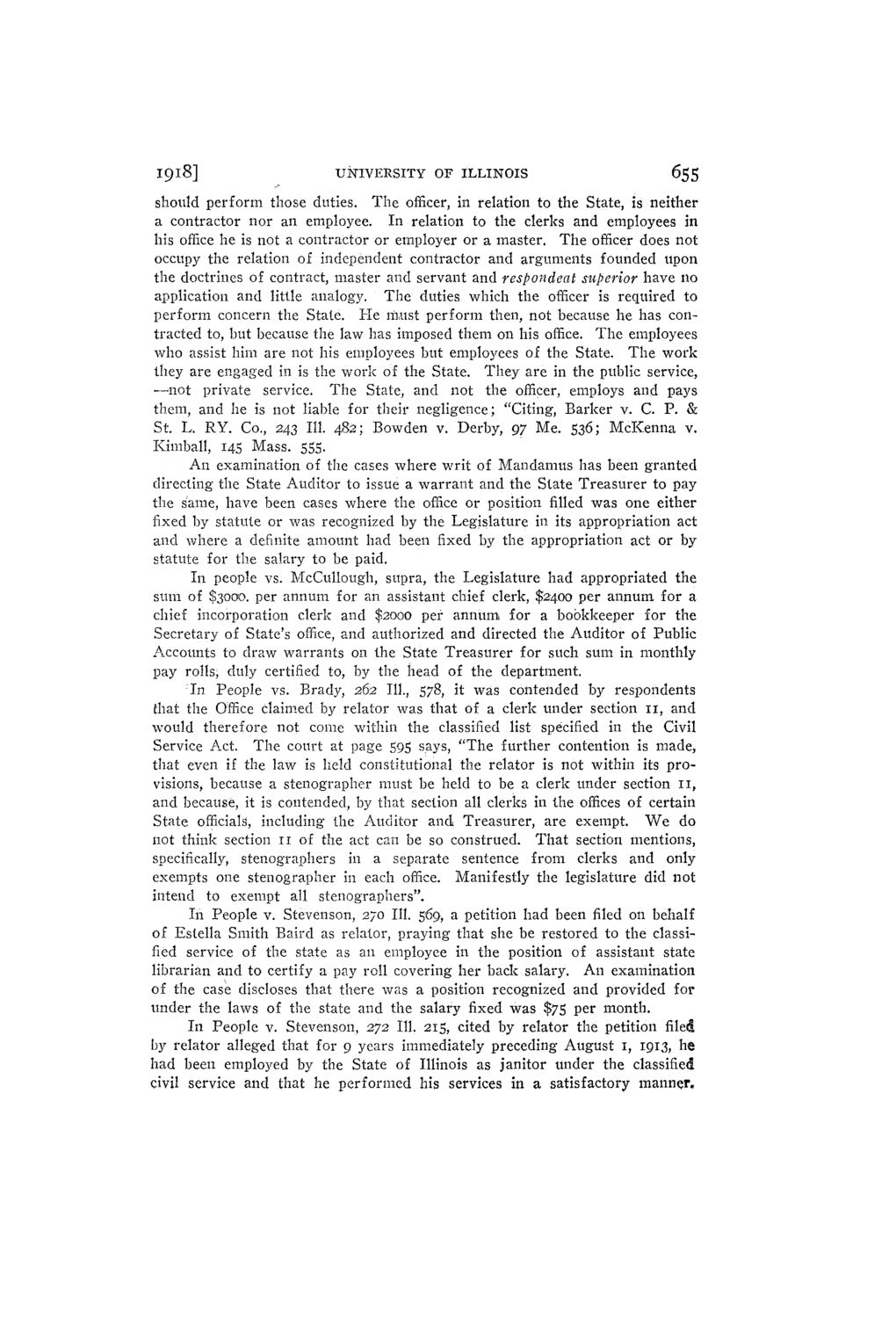| |
| |
Caption: Board of Trustees Minutes - 1918
This is a reduced-resolution page image for fast online browsing.

EXTRACTED TEXT FROM PAGE:
I918] UNIVERSITY OF ILLINOIS 655 should perform those duties. The officer, in relation to the State, is neither a contractor nor an employee. In relation to the clerks and employees in his office he is not a contractor or employer or a master. T h e officer does not occup3^ the relation of independent contractor and arguments founded upon the doctrines of contract, master and servant and respondeat superior have no application and little analogy. The duties which the officer is required to perform concern the State. H e must perform then, not because he has contracted to, but because the law has imposed them on his office. T h e employees who assist him are not his employees but employees of the State. T h e work they are engaged in is the work of the State. They are in the public service, —not private service. The State, and not the officer, employs and pays them, and he is not liable for their negligence; "Citing, Barker v. C. P. & St. L. RY. Co., 243 111. 482; Bowden v. Derby, 97 Me. 536; McKenna v. Kimball, 145 Mass. 555. An examination of the cases where writ of Mandamus has been granted directing the State Auditor to issue a warrant and the State Treasurer to pay the same, have been cases where the office or position filled was one either fixed by statute or was recognized by the Legislature in its appropriation act and where a definite amount had been fixed by the appropriation act or by statute for the salary to be paid. In people vs. McCullough, supra, the Legislature had appropriated the sum of $3000. per annum for an assistant chief clerk, $2400 per annum for a chief incorporation clerk and $2000 per annumi for a bookkeeper for the Secretary of State's office, and authorized and directed the Auditor of Public Accounts to draw warrants on the State Treasurer for such sum in monthly pay rolls, duly certified to, by the head of the department. In People vs. Brad}', 262 111., 578, it was contended by respondents that the Office claimed by relator was that of a clerk under section 11, and would therefore not come within the classified list specified in the Civil Service Act. The court at page 595 says, "The further contention is made, that even if the law is held constitutional the relator is not within its provisions, because a stenographer must be held to be a clerk under section 11, and because, it is contended, by that section all clerks in the offices of certain State officials, including the Auditor and Treasurer, are exempt. W e do not think section 11 of the act can be so construed. T h a t section mentions, specifically, stenographers in a separate sentence from clerks and only exempts one stenographer in each office. Manifestly the legislature did not intend to exempt all stenographers". In People v. Stevenson, 270 111. 569, a petition had been filed on behalf of Estella Smith Baird as relator, praying that she be restored to the classified service of the state as an employee in the position of assistant state librarian and to certify a pay roll covering her back salary. An examination of the case discloses that there was a position recognized and provided for under the laws of the state and the salary fixed was $75 per month. In People v. Stevenson, 272 111. 215, cited by relator the petition filed by relator alleged that for 9 years immediately preceding August 1, 1913, he had been employed by the State of Illinois as janitor under the classified civil service and that he performed his services in a satisfactory manner.
| |